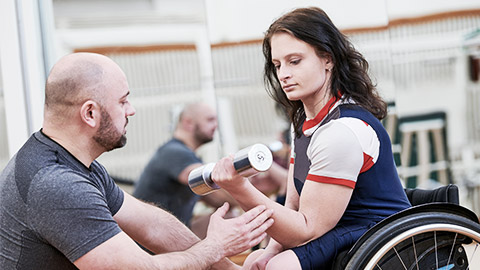Welcome to Collaboration and Referral!
In this topic, you'll learn about your ethical responsibilities and professional boundaries, including following a code of conduct and staying within your scope of practice. You'll also learn the importance of collaborating with healthcare professionals, such as general practitioners, dietitians, and physiotherapists and referring clients when appropriate.
We'll explore the different professions you may collaborate with as a personal trainer. Referral and collaboration with allied health care professionals and others can help you provide optimal care when coaching special populations.
We’ll cover:
- Code of conduct
- Scope of practice and referral
- General Practitioners
- Dietitians
- Pharmacists
- Physiotherapists
- Occupational Therapists
- Mental health and addictions
- Complementary and alternative medicine
- Sports coaches
- Organisations involved in the care of special populations

The fitness industry is governed by codes of conduct that exercise professionals must adhere to in New Zealand. 2 of the most important codes are the NZ REPs Code of Ethical Practice and the ExerciseNZ Code of Ethics. It is important for exercise professionals to be aware of and abide by these codes of conduct to ensure the safety and wellbeing of their clients, as well as to maintain the reputation and integrity of the fitness industry as a whole.
NZ REPs Code of Ethical Practice
The NZ REPs Code of Ethical Practice emphasises the importance of maintaining a high degree of professionalism and ethical conduct in the industry. This code includes 5 principles that all registered exercise professionals are expected to follow. These principles include:
- Uphold professional standards
- Maintain safety
- Appropriate relationships
- Respect privacy
- General professionalism
Download the Code: REPs Code of Ethical Practice.
Breaches of the Code
In the event of a breach of the code, individuals can make a formal complaint to REPs, and a disciplinary panel will review the case and make binding decisions. Potential sanctions for violating the code include suspension or termination of REPs registration, a reprimand or formal warning, or other determinations the panel considers appropriate.
ExerciseNZ Code of Ethics
Adhering to the ExerciseNZ Code of Ethics is essential for personal trainers operating in clubs that are members of ExerciseNZ.
This code outlines the expectations for ethical conduct and professional standards within member clubs. Key principles include:
- Provision of a secure exercise environment
- Pre-screening of members for medical conditions
- Continuous improvement of professional knowledge
- Avoidance of false claims
- Prohibition of high-pressure sales tactics
- Protection of clients' privacy
In addition, trainers must adhere to the code's policies regarding membership terms and conditions, transfer policies, and the use of drugs or performance-enhancing substances.
Download the Code: ExerciseNZ Code of Ethics.
Access the sub-codes: Membership Terms and Conditions and Use of Drugs/Performance Enhancing Substances.
Individuals can make a formal complaint to ExerciseNZ if there has been a breach of the Code.
Other codes
In addition to these codes, gyms and fitness centres may also have their own codes of conduct that trainers must follow if operating in the facility.
Importance of adhering to the Codes when working with special populations

Exercise professionals can make a positive impact on the health and wellbeing of special populations by following the codes of conduct and ensuring that they are providing safe and effective exercise programmes.
Understanding the codes of conduct outlined by NZ REPs and ExerciseNZ is particularly important when working with special populations. Clients in these groups often require specialised training programmes that take into account their unique needs and health conditions. By adhering to these codes, you can ensure that you are providing safe and effective exercise programmes that are tailored to your special population clients' needs.
For example, one of the principles outlined in the NZ REPs Code of Ethical Practice is maintaining safety.
Maintain Safety
Registered Exercise Professionals will:
- Prioritise the health and safety of participants, including meeting all obligations under the Health and Safety at Work Act 2015
- Ensure that every participant has been appropriately pre-screened
- Never advocate or condone the use of prohibited drugs, or banned performance enhancing substances
- Identify and respect the physical limits and ability of participants
This is especially relevant when working with clients with physical limitations or health conditions requiring extra precautions. Exercise professionals must ensure that they follow appropriate safety protocols and modifications for each client to prevent injury and avoid exacerbating health conditions.
Similarly, the principle of respecting privacy is important when working with clients who may be self-conscious about their weight or physical abilities. Exercise professionals must be sensitive to their clients' needs and provide a supportive environment that fosters confidence and trust.
When working with special population clients, you must recognise when to seek assistance for any serious health problems identified. Your role is limited to providing exercise advice, and you should collaborate with qualified health professionals for medical issues. Providing nutrition, mental health counselling, or other specialised services outside your expertise is not allowed.
Being aware of your limitations is crucial to working within your scope. It is also important to remember the language used when requesting the client to seek further health advice from health professionals. Remember, you cannot diagnose a client with a health issue, but you can make a professional recommendation that they seek further support to help support their exercise and fitness programme with you.
Scope of practice
You should be familiar with your scope of practice determined by REPs registration and your qualification. Take a moment to read the scope of practice documents.
Read:
- NZ REPs Scope of Pratice
- NZ REPs Foundation Level Requirements
- NZ REPs Exercise Prescription Level Requirements
Pay special attention to limitations. Personal trainers are not endorsed to:
- Provide physical or health rehabilitation
- Undertake postural analysis
- Provide personalised nutritional advice
Therefore, if a client needs physical or health rehabilitation, a postural analysis, or personalised nutrition advice, you must refer to a qualified practioner.
Working with health professionals

Health professionals are qualified practitioners with specialised expertise in diagnosing, preventing, and treating various illnesses and conditions.
On occasion, you may have to refer your client to an external health professional before you begin training or during the course of your training sessions. Like in the nutrition module, there are instances where it may be beneficial for your client to seek help from someone like a registered nutritionist or dietitian, and this of course can be applied to other aspects of health.
You may also need to work alongside or collaborate with health professionals or other health-related service providers to ensure your client receives the level of care appropriate for their needs.
Typically, in New Zealand, you refer to a General Practitioner (GP) as your client's primary care provider who will then refer to a specialist. However, there are certain circumstances where you can go directly to the specialist.
Common concerns
Let's consider some scenarios you may come across as a personal trainer.
Negative remarks about body, low energy/mood, unusual eating patterns
Your client is making remarks about their body, having low energy and mood, or unusual eating patterns like skipping meals throughout the day only to eat large portions of “junk” when they get home.
You should refer them to their GP with the intention of referral to a dietitian or psychologist as well as getting things checked out like blood tests for hormone imbalances or nutrient deficiencies.
Experiencing pain
Your client makes remarks about or experiences pain when performing certain exercises or has difficulty using the regular equipment at the gym.
You should refer them to a Physiotherapist, Osteopath, Chiropractor, Occupational Therapist, or Podiatrist (with or without GP referral first) to help with these issues.
Sports supplements
Your client wants to try different sports supplements, but you know they take some medications for things like high blood pressure, cholesterol, diabetes, mental health or really any other medications.
You should refer them to their GP or a pharmacist to discuss potential drug interactions.
Signs of stress, mood changes, or feeling anxious
Your client is exhibiting signs of stress, abrupt changes in mood, feeling anxious, discussing fears and concerns, not being interested in what you are doing in the gym even though they were loving it a couple months ago.
Have a chat about referring to a mental health professional or their GP.
Collaborating with other professionals
You may need to collaborate with non-health professionals to support your clients such as sports coaches. Your client may not be a professional athlete, but they may attend multiple sports practices and games throughout the week so understanding the types of movements/exercises they are performing during these sessions is important to plan appropriate intensities and volume to their training.
When working with other health professionals, especially when you specifically refer your client to someone, it is important that you focus on promoting services that are evidence-based and have a well-known regulatory body in New Zealand.
Let’s look into the different health professionals and associations in order to gain a better understanding of their roles and qualifications.
Watch
A wide range of services are available in New Zealand to support different special population groups. The following are examples of organisations and programmes that can provide services to clients.
Sport New Zealand and High Performance Sport New Zealand
Previously known as the Hillary Commission (1995 - 2001) and SPARC (2002 - 2008).
Sport NZ is a kaitiaki (guardian) of the play, active recreation, and sport system in New Zealand. The organisation promises and supports quality experiences in play, active recreation, and sport to improve physical activity levels and wellbeing of New Zealanders. Sport NZ Group includes High Performance Sport New Zealand, which leads the high performance sport system, supporting athletes and coaches nationally and internationally.
Their strategic direction includes the Sport NZ Ihi Aotearoa Maori Activation Plan, a focus on young people, and building collective resolve to grow physical activity levels in New Zealand.
Watch
Watch the video to see how Sport NZ wants to help get every body active, including special population groups.
Head to their website to read more about Sport NZ.
Age Concern New Zealand
Age Concern New Zealand is a charity dedicated to people over 65, their friends, and whānau. They promote dignity, wellbeing, equity, and respect and provide expert information and support services in response to older people's needs.
They are active and vocal on relevant issues and work to ensure older people stay connected with their family, friends, and community.
One of the services Age Concern offer is health promotion. This includes falls prevention education, strength and balance classes, physical activity groups, and nutrition courses and workshops for older people. Some Age Concerns offer wellbeing expos, sleep seminars and mindfulness/mental wellbeing sessions. Collectively, they enable older people to participate and stay healthy and connected in their community.
Watch
Check out this short ad for International Day of Older Persons from Age Concern.
Halberg Foundation
The Halberg Foundation is a charitable organisation founded on the belief that all people, regardless of ability, should have equal opportunity to enhance their lives through sport and recreation. The organisation work with physically disabled young people and their families to get them involved in sports and recreation. They collaborate with schools, local sport and recreation organisations, facilities, and clubs to raise awareness and capability for inclusive sports programmes and events.
Watch
Watch this short video from Attitude about the Halberg Foundation and Paralympians.
